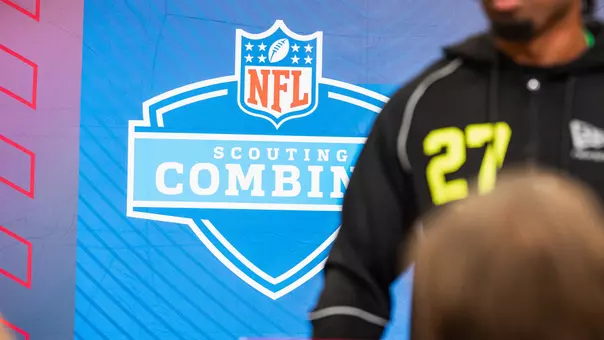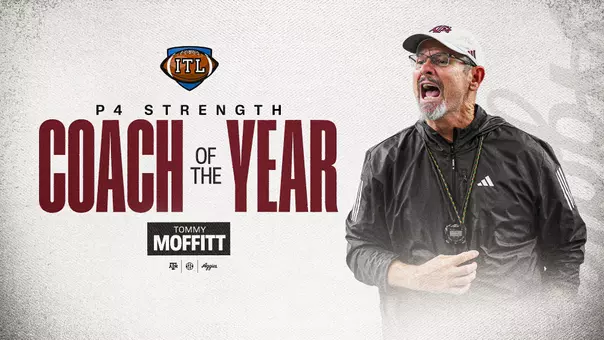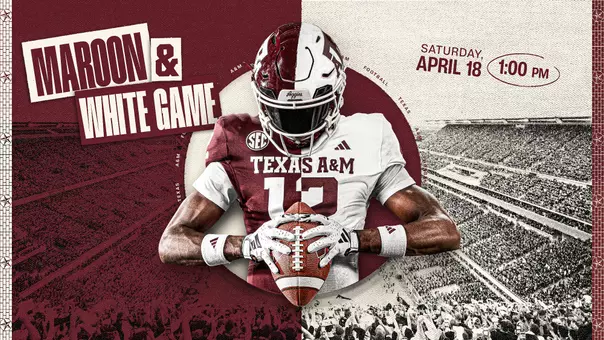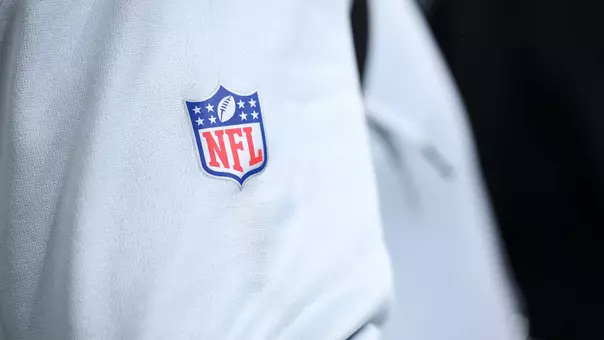Photo by: Thomas Campbell/Texas A&M Athletics
A Conversation with Jimbo Fisher
Dec 04, 2017 | Football
Jimbo Fisher's first interview after being named the head coach at Texas A&M on Monday was inside 12th Man Studios. Host Will Johnson discussed with him philosophy, work ethic, the SEC and more.
Let's just start by welcoming you to Aggieland. Great to have you here.
"Glad to be here. Extremely happy to be here."
If we look back at what you've accomplished, you come from Florida State. You go to the 2014 College Football Playoff. The year before you're a national champion. Six of your eight years in Tallahassee you won double-digit (games). What makes a good team elevate to elite status like those did?
"I think it's the ability to have a oneness and one vision. I say you either live in vision or you live in circumstance…and getting kids to believe in the one vision and play selfless and then play with a great consistency and desire to achieve something together as a team. Everybody's so outcome-oriented. The great teams aren't outcome-oriented. They're process-oriented. And their goals and their aspirations aren't about the results. They're about the process about how to be one. When they understand that, then you can achieve greatness."
You'll obviously want to hit the ground recruiting. That's a key part of what you want to do right away. But when you get a chance to meet with the guys on the current roster, what's the initial message that you want to convey to them?
"That we're not interested in being good. We're interested in being elite. We're interested in being great. And there's a sacrifice that you have to make to do that. You have to create those championship habits daily. If you do those things, anything can be achieved. We have to understand that and what our whole goal and mission (is) and create a culture around here that's conducive to success in all phases of our life—as a person, as a student, as a player. When you exceed those things in all three areas, you can then reach that championship level and the dreams and aspirations you have. Because are they really dreams or are they a vision? And if you truly have the vision, and you can see that, you can achieve that. You have to be able to see that vision to be able to achieve it. But also, you've got to pay the price…there's a toll and a price you have to pay to get there. I think we can do that, and that's why I'm here."
You grew up in West Virginia with a father who was a coal miner and a farmer. He woke up at midnight to work the coal mines so he could be on the farm during the day. I'm guessing work ethic is going to be a big message for you and your program.
"It is, because you can't achieve anything without work. There's no secret to success. The secret is (that) there's no secret. You've got to have a comprehensive plan and you've got to work to it and you have to do the things you have to do to be successful. There's no time limit on any of it. You have to do what you have to do…and that can be short amount of time or a long amount of time, depending on how you go about your process of doing things. Work ethic is not going to be an issue, and we have to have people in the organization who think the same way."
In your days as a player, you were a quarterback. At Samford, your senior year, you throw for 34 touchdowns, and you're the Division III Player of the Year. And then at your assistant coaching stops, you're also dealing with the quarterback quite a bit. Now that you're a head coach, do you still like to get in there with the signal-callers? Is that a big part of what you do?
"I'm in those quarterback meetings all the time (laughing). That's the love and passion I have. I love being the head coach, I love the comprehensive organization, but your passion is what you grew up on. Coaching that quarterback and getting (him) to see things as you see and having that vision and understanding what you're trying to accomplish…that play can mean 10 different things when it's called. But when it's called, why it's called, the situation it's called in, the time on the clock, the down and distance, the score in the game…all those things. Getting a young man to understand what you see is one of the (most fun) things. Again, it's about the vision they have to be a leader, to be a winner, and do the things you have to do. That's still one of my passions. I will have a quarterback coach that does things, but I still will have some connection with that, for sure."
Also as an assistant, you were at Auburn, at LSU, even at Florida State, you butted heads with the SEC quite a bit…frankly, you were 10-2 against the SEC as a head coach at Florida State. But do you feel even though you've been in the ACC the last eight years you've got knowledge of this league and what it takes to win here?
"No doubt. The thing about this league I tell folks is listen…other leagues, everybody has good players. There are good players all across this country. But the passion to be great in this league—from the fan base, to the administration, to the whole organization, to the booster clubs, to everything that goes on—I think is second to none. There's this thing I tell our players, 'Your actions speak so loud I can't hear what you're saying'. Everything these programs do, from facilities to stadiums to comprehension of what you have to have and the ingredients (you need) to build around your program…in everything they do they say football is important. We want to be great. We will invest in what we want to be great at. You see it in every program in this league."
Coach Fisher, welcome to Texas A&M. Glad to have you here.
"Glad to be here."
Let's just start by welcoming you to Aggieland. Great to have you here.
"Glad to be here. Extremely happy to be here."
If we look back at what you've accomplished, you come from Florida State. You go to the 2014 College Football Playoff. The year before you're a national champion. Six of your eight years in Tallahassee you won double-digit (games). What makes a good team elevate to elite status like those did?
"I think it's the ability to have a oneness and one vision. I say you either live in vision or you live in circumstance…and getting kids to believe in the one vision and play selfless and then play with a great consistency and desire to achieve something together as a team. Everybody's so outcome-oriented. The great teams aren't outcome-oriented. They're process-oriented. And their goals and their aspirations aren't about the results. They're about the process about how to be one. When they understand that, then you can achieve greatness."
You'll obviously want to hit the ground recruiting. That's a key part of what you want to do right away. But when you get a chance to meet with the guys on the current roster, what's the initial message that you want to convey to them?
"That we're not interested in being good. We're interested in being elite. We're interested in being great. And there's a sacrifice that you have to make to do that. You have to create those championship habits daily. If you do those things, anything can be achieved. We have to understand that and what our whole goal and mission (is) and create a culture around here that's conducive to success in all phases of our life—as a person, as a student, as a player. When you exceed those things in all three areas, you can then reach that championship level and the dreams and aspirations you have. Because are they really dreams or are they a vision? And if you truly have the vision, and you can see that, you can achieve that. You have to be able to see that vision to be able to achieve it. But also, you've got to pay the price…there's a toll and a price you have to pay to get there. I think we can do that, and that's why I'm here."
You grew up in West Virginia with a father who was a coal miner and a farmer. He woke up at midnight to work the coal mines so he could be on the farm during the day. I'm guessing work ethic is going to be a big message for you and your program.
"It is, because you can't achieve anything without work. There's no secret to success. The secret is (that) there's no secret. You've got to have a comprehensive plan and you've got to work to it and you have to do the things you have to do to be successful. There's no time limit on any of it. You have to do what you have to do…and that can be short amount of time or a long amount of time, depending on how you go about your process of doing things. Work ethic is not going to be an issue, and we have to have people in the organization who think the same way."
In your days as a player, you were a quarterback. At Samford, your senior year, you throw for 34 touchdowns, and you're the Division III Player of the Year. And then at your assistant coaching stops, you're also dealing with the quarterback quite a bit. Now that you're a head coach, do you still like to get in there with the signal-callers? Is that a big part of what you do?
"I'm in those quarterback meetings all the time (laughing). That's the love and passion I have. I love being the head coach, I love the comprehensive organization, but your passion is what you grew up on. Coaching that quarterback and getting (him) to see things as you see and having that vision and understanding what you're trying to accomplish…that play can mean 10 different things when it's called. But when it's called, why it's called, the situation it's called in, the time on the clock, the down and distance, the score in the game…all those things. Getting a young man to understand what you see is one of the (most fun) things. Again, it's about the vision they have to be a leader, to be a winner, and do the things you have to do. That's still one of my passions. I will have a quarterback coach that does things, but I still will have some connection with that, for sure."
Also as an assistant, you were at Auburn, at LSU, even at Florida State, you butted heads with the SEC quite a bit…frankly, you were 10-2 against the SEC as a head coach at Florida State. But do you feel even though you've been in the ACC the last eight years you've got knowledge of this league and what it takes to win here?
"No doubt. The thing about this league I tell folks is listen…other leagues, everybody has good players. There are good players all across this country. But the passion to be great in this league—from the fan base, to the administration, to the whole organization, to the booster clubs, to everything that goes on—I think is second to none. There's this thing I tell our players, 'Your actions speak so loud I can't hear what you're saying'. Everything these programs do, from facilities to stadiums to comprehension of what you have to have and the ingredients (you need) to build around your program…in everything they do they say football is important. We want to be great. We will invest in what we want to be great at. You see it in every program in this league."
Coach Fisher, welcome to Texas A&M. Glad to have you here.
"Glad to be here."
Mike Elko Press Conference
Monday, February 16
Aggie Football Club
Monday, February 02
Miami Postgame: Klein, Reed, Craver
Saturday, December 20
Miami Postgame: Bateman, York, Brooks, Sanford
Saturday, December 20















